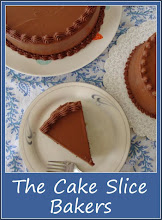Baking the Christmas cake is something I look forward to every year. Its fun choosing the fruit combination, I always stick to the basics but try to have something a little different each time. The fruit is then soaked overnight in brandy before being baked into the dark spicy cake mix the following day. Whereupon more brandy is added and the baked cake is wrapped up tight and squirreled away to mature for a few weeks before being marzipaned and iced in the run up to Christmas. Having to wait before eating it fills me with excited anticipation, and I’m sure it makes it tastes better when I finally get to taste it on Christmas Day. There is just something so festive and traditional about its preparation and the aromas that waft through the house on baking that it can’t help but put me in a good mood.
I normally try to get the cake baked by mid November so it has lots of time to mature, but I have only just got round to it this year – where have the days gone?? The arrival of a light scattering of snow at the end of last week meant staying indoors with the Christmas cake mix was a far cosier prospect than venturing outside, so now we have Christmas cake!
This year the Christmas cake is, of course, going to be gluten free. However, this does not offer any problems as Christmas cake is basically lots of fruit stuck together with a bit of cake mix, rather than a cake containing fruit. Its got so much fruit that you don’t need to worry about it not rising or being fluffy enough as this is not that sort of cake. You could even replace the all the flour with ground almonds and still end up with a delicious cake.
For my cake I decided to use a combination of buckwheat flour and brown rice flour. I love the flavour of buckwheat and the brown rice has a nice fine texture, plus a bit of hidden fibre never hurt anyone. If you want to make a non GF cake then just add the same amount of plain flour in place of the rice and buckwheat flours. If you do want to make this cake gluten free then be sure to check your ingredients carefully. I’ve used fresh citrus zest in place of candied peel as I prefer it, but I did look at the back of the packet and was surprised to see that they’d added wheat flour to try and prevent the little peel pieces from sticking together. Why they bother when it’s covered in sticky syrup anyway I don’t know, but be sure to check!
I love the colours of this fruit mix. It’s so cheering to cut into a slice of the dark cake and see the glossy reds, browns and oranges of the dried fruits peeping out. After the fruits have been soaking in brandy they smell heavenly, all sweet, citrusy and alcoholic. However, nothing surpasses the aroma that wafts from the oven while the cake is baking, hot warm spices and sticky dark treacle – ahh bliss.
Feel free to adapt the fruit and soaking liquid below to suit your own preferences or whatever you have on hand. I added some dried apple this time but in the past I’ve used dried cranberries, figs and prunes. Experiment and have fun!
Click below to see my Christmas cakes from Christmases past (Look back through November and December from 2 years ago for a complete set-by-step guide to creating a Christmas cake.
I’ll do another post nearer Christmas and show you this years design!
3 years ago – Poinsettia
2 years a go – Holly Wreath
1 year ago – Gingerbread House
Gluten Free Christmas Cake
Fruit Soaking Mix
170g raisins
170g sultanas
50g dried apricots
50g glace cherries
35g dried apple rings
Zest of 1 lemon
Zest of ½ orange
50ml brandy
Cake Mix
100g buckwheat flour
80g brown rice flour
20g ground almonds
120g light muscovado sugar
120g soft butter
1 tsp mixed spice
25g black treacle
2 eggs
Feeding
20ml Brandy
Method
Place the raisins and sultanas into a bowl. Chop the cherries into quarters and add to the bowl. Chop the apricots and dried apple into pieces the size of the sultanas and add to the bowl.
Add the zest of the lemon and orange.
Drizzle over the Brandy and stir to coat. Cover with cling film and leave for at least 24 hours in a cool place to allow the fruit to plump up and absorb the Brandy.
To make the cake
Lightly grease a 6.5inch/17cm deep round spring form tin. Grease the tin well and line the base greaseproof paper. Preheat the oven to 140C.
Make sure your butter is soft, then weigh all the cake ingredients, expect the pre soaked fruit into a bowl and beat with an electric mixer until well combined.
Add the pre soaked fruit, including any remaining juices and fold together using a spatula.
Spread the mix into the tin, creating a dip in the middle to allow for doming in the oven. Press down gently.
Bake in the oven for 2hours 10minutes until browned and quite firm to the touch.
Allow to cool in the tin for 1 hour before pricking the surface of the cake and drizzling over 20ml of Brandy. Cover the cake and leave to cool in the tin before unmolding. Leave the greaseproof paper on the base and wrap the cake tightly in clingfilm and leave to mature for at least two weeks. Feed again with another 15ml of Brandy one week later. A week before Christmas, trim the top of the cake into a level surface and brush with a little more brandy before adding a layer of marzipan and covering in fondant and decorating. Also tastes great un-iced if desired.
Makes 1 x 6.5inch/17cm cake
Beef and Vegetable Stew
1 hour ago













































